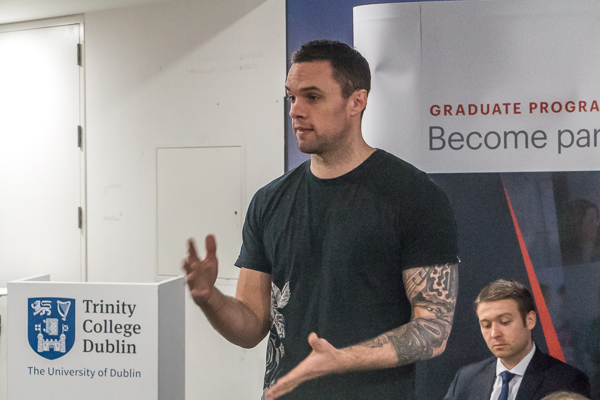For many who would meet Niall “Bressie” Breslin initially, you would think he has a great life. A successful musician, coach on The Voice of Ireland, bestselling author, athlete, and mental health activist with mental health group A Lust for Life.
But his journey to where he is today has not been easy, mimicking the lives of so many others who have gone through similar situations. The difference is he has been able to use his experience to educate others, actively promoting positive mental health and encouraging people to just talk to someone. “I don’t do inspiring quotes”, he told a packed Global Room on Trinity’s campus today, but his simple message of going to talk to someone, echoed by advisors from the Careers Advisory Services, resonated with the captivated crowd that had gathered.
To hear the journey that Breslin has been on with his mental health was an eye-opener for many, making people truly realise that no matter who you are or what kind of life you may have, struggles with mental health can be had by anyone you might pass walking down the street.
Talking about his first experience with anxiety at the age of 13 living on the border of Israel and the Lebanon, he described it as “life-robbing… very difficult to endure”. When something like that occurs in 1990s Ireland when mental health was a taboo-type topic, Breslin reflected on how alone he felt during that time where he had no one to turn to.
Describing his first panic attack as a teenager, something that he noted is “very normal”, he said, “you think you’re dying” and it feels impossible to breathe. Considering that in the present day that there are now so many options to help with dealing with panic attacks and anxiety, to hear someone speak of how they dealt with this alone put things into perspective on how things have progressed.
Breslin pointed out that his “perfect middle-class country background” – great family support, working well in school, excelling in sports – would portray this image of someone who knew what they wanted in life. But things could not have been further from the truth in Breslin’s youth. He talked about a time when he broke his own arm and how he “calmly rationally decided how to take my own life”. Telling his mother that he didn’t feel right was a step in the right direction, but he also noted how it wasn’t the end of his troubles, and he dropped out of college, despite a sports scholarship.
Breslin was diagnosed with clinical depression in his mid-20s and today he referred to being on a constant low, but he brought the audience’s attention to the fact that these struggles could happen to anyone, even for those who might find getting out of bed difficult.
“Face them fears” was Breslin’s advice, asking the audience to face their deepest anxieties with confidence. His “chronic fear of failure”, even when he switched to focus on creating music, was what he described as “a one-way street to being unhappy”.
There is no typical person who might suffer from mental health issues, Breslin said. This includes the likes of athletes, from GAA star who fear letting their parish down to Olympic athletes for whom, he said, the athletes village is just one big asylum.
The pressure to be “pillars of perfection” makes this all the worse, he said.
Breslin finally decided he was going to take control of his mental health after suffering a breakdown before a live show of The Voice of Ireland when he was on the show as one of the coaches.
His method of naming his mind, which he thereafter referred to as Jeffrey, helped him regain that control he needed. Moving on to tell the audience of how he began his recovery in seeing a new doctor and practising mindfulness, he encouraged the room to take the time out to “get off that red-zone” and take the time you need to bring yourself back from the racing world around you, to take the mask off you present to the world and not to hide who you are.
Breslin’s enlightening talk ended with him giving five necessary tips for those who wanted to practise positive mental health and working on how to deal with set-backs that may present themselves in life. He pleaded with the group to limit their own exposure to toxic people, to show gratitude in life and say 30 things in your head you are thankful for as he believed this would make you feel good as you think about them.
Two of his biggest points he made at the end of the talk was that he asked for people to stop judging others because “you’ve no idea what they’re living with”.
“Ninety nine per cent of people are sound, but you’ll never hear about them”, he said, asking people to embrace the good things in their lives.







